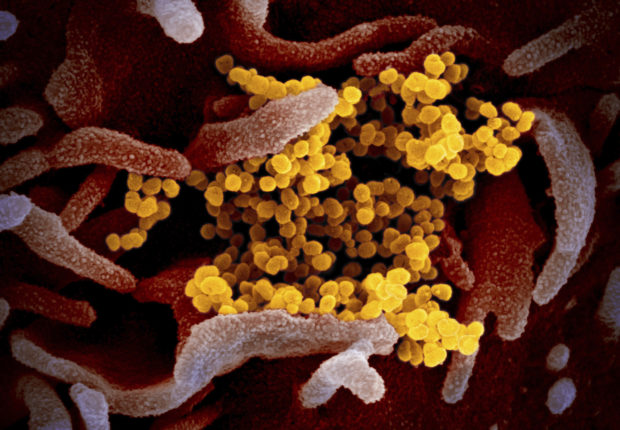OCTA Research says NCR now moderate risk for COVID-19 transmission

This undated electron microscope image made available by the U.S. National Institutes of Health in February 2020 shows the Novel Coronavirus SARS-CoV-2. (NIAID-RML via AP)
MANILA, Philippines — Pandemic monitor OCTA Research said Thursday that Metro Manila is now at moderate risk for COVID-19 transmission as the region’s reproduction number and other key coronavirus figures increased in the recent week.
According to OCTA Research’s latest report, Metro Manila’s classification changed from very low risk (December 16-22) to moderate risk based on figures from December 23-29.
The analytics group said the National Capital Region (NCR) recorded an average of 215 cases from December 23-29. The previous week’s average was 79 cases.
The reproduction number, or the average number of new cases stemming from an infected patient, also jumped from 0.51 to 1.47, which OCTA Research said was “considered critical.” The group previously said the reproduction number should be less than one to indicate a decreasing trend.
On the positivity rate, or the percentage of people testing positive among all those tested, OCTA Research noted the increase from 0.69 percent to 3.86 percent. The average number of RT-PCR tests conducted was 14,119, lower than 17,595 tests during the previous week, it added citing information from the Department of Health (DOH).
Article continues after this advertisementAs for the average daily attack (ADAR) rate per 100,000 individuals, the pandemic monitor said it also increased from 0.56 per day to 1.52 per day.
Article continues after this advertisement“This is not surprising because of the increased number of holiday gatherings during the week of the holiday. At this time, it is still uncertain if there will be a continued increase in the number of new COVID-19 cases, or if this number will drop back down once the holidays are over,” OCTA Research said.
“We need to prevent this increase in new cases in the NCR from becoming a surge of infections,” it added.
OCTA Research then pointed out the slight increase in hospital utilization rate from 18 percent to 19 percent.
“The number of hospital beds occupied increased by 8% compared to the previous week, while the number of ICUs occupied increased by 12% during the same time frame,” it explained.
Indicators being used by OCTA Research are based on covidactnow.org and not on metrics of the DOH. Metro Manila is still classified as a minimal risk under DOH metrics as of December 26.
Recommendations
OCTA Research consequently provided recommendations amid the increase in COVID-19 cases in Metro Manila. Among them were the improvement of testing and tracing, monitoring of compliance to health protocols, reactivation isolation facilities that were shut down, acceleration of vaccination, and the evaluation of current alert levels at the appropriate time.
The group likewise urged the private sector to enforce public health standards in their establishments, and the local government units to implement local border controls.
“The LGUs must implement strict local border controls, particularly for travelers coming from moderate to high-risk areas. It must increase restrictions for children 12 years old and below, unvaccinated individuals, and persons who are at high risk for severe illness,” it said.
The public is likewise urged to strictly adhere to minimum public health standards amid the increase in COVID-19 infections.
“To this end, we exhort our citizens to continue to strictly adhere to minimum health protocols and to get vaccinated if they have not been vaccinated, and to reduce nonessential travel and attendance of large social gatherings to prevent exposure to the virus,” OCTA Research said.
“In addition, we exhort our citizens to self-isolate and avoid going out if they are feeling symptoms of colds such as cough, fever, sore throat, etc.,” it also said.
RELATED STORIES
As positivity rate rises, NCR seen to tally 1,000 new COVID-19 cases Dec 30 – OCTA Research fellow
DOH uncertain if rise in COVID-19 cases due to Omicron variant
KGA
For more news about the novel coronavirus click here.
What you need to know about Coronavirus.
For more information on COVID-19, call the DOH Hotline: (02) 86517800 local 1149/1150.
The Inquirer Foundation supports our healthcare frontliners and is still accepting cash donations to be deposited at Banco de Oro (BDO) current account #007960018860 or donate through PayMaya using this link.